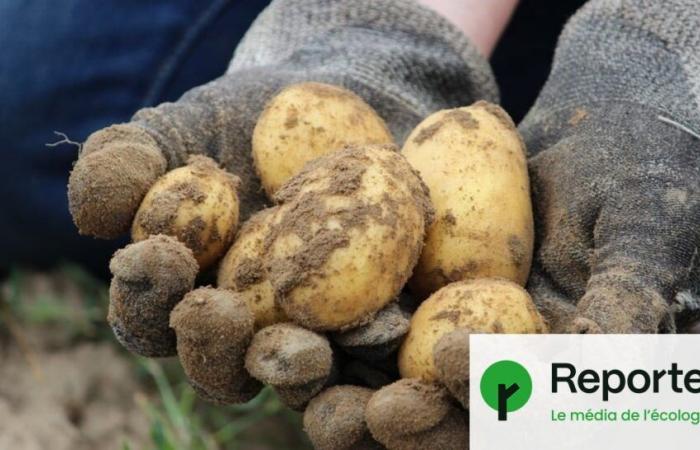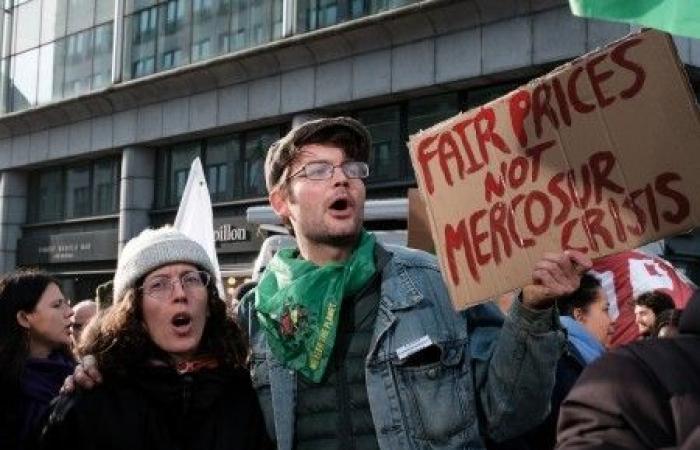Remunerative prices ! This nagging demand from farmers across Europe is resurfacing with the peasant demonstrations planned for the week of November 18.
In France, the Egalim law has provided since 2018 for « price tunnel » (or a range), below which a buyer cannot go during a transaction. But there is general agreement that these prices do not sufficiently take into account real production costs and controls are insufficient. Selling at a loss remains a reality for many farmers.
For its part, Spain legislated in 2013 with the law « food chain »which was strengthened in 2021 and now makes it possible to set fair prices, farm by farm. Álvaro Areta García, member of the Via Campesina European Coordination and technical manager at the Agriculture Committee (COAG), one of the governing bodies of the Food and Agriculture Organization of the United Nations, explains it to us.
Reporterre — How the law works in practice « Food chain » (food chain) ?
The Spanish Food Chain Law, in place for more than ten years, aims to make commercial relations between producers and buyers more transparent and equitable. It requires the drafting of written contracts, containing essential information such as delivery conditions and prices. This contractual framework has strengthened legal certainty and facilitated negotiations. In December 2021, this law was amended to introduce a major change: it is now prohibited to « destroy the value » in the food chain.
Concretely, this means that the price negotiated between the parties must be at least higher than the farmers' production costs. This marks a cultural shift, because previously prices were set based on the price paid by consumers, often to the detriment of producers.
A farmer in Catalonia, in the middle of the drought of March 2024.
© Lorena Sopena Lopez / Anadolu via AFP
This new approach requires reorganizing the value chain in a fairer way, starting from producer costs. This change is difficult to apply and arouses resistance, but it aims to establish fair remuneration at each link in the chain.
How are prices calculated ?
The law requires that the sales price covers the specific production costs of each producer. This implies that producers know their production costs. It's an extra effort for them, but ultimately it allows them to be clear about their level of profitability: from what price do they start making or losing money ? This question, which should be natural in any business, was sometimes not so clear in the case of the production sector.
What happens if the price offered by the buyer remains lower than production costs ?
If a producer believes they are being paid below their costs, they can file a complaint, but they must provide accounting evidence, such as invoices, to support their claim. This helps avoid a word-for-word confrontation. Complaints can also be anonymous. Agricultural organizations like the COAG can file a complaint on behalf of producers, while guaranteeing the confidentiality of the information provided.
Once the complaint is received, the competent authority carries out an ex officio investigation to verify the facts and, if necessary, opens a file, while preserving the anonymity of the complainant.
Are there cases of major infringement and how are the competent authorities dealing with them? ?
Major violations in Spain's agri-food sector are mainly linked to cost increases caused by geopolitical factors, such as the war in Ukraine, rather than chain law enforcement. These cost increases were passed down the chain, causing inflation independent of the law.
To respond, the Spanish authorities have put in place support measures, such as subsidies for production costs, reductions in TVA on certain basic products and aid to compensate for the increase in production costs.
In what context was this law established? ?
The agricultural sector has experienced persistent economic difficulties, mainly due to market deregulation and the removal of mechanisms linked to the Common Agricultural Policy, which helped to stabilize prices. Combined with increased competition from low-cost imports, this has weakened the income of local producers. Many farmers are threatened with bankruptcy.
Faced with this situation, numerous mobilizations broke out in 2020, before the pandemic, demanding fair prices above production costs. These pressures led the government to adopt protective measures, including the law on the food chain, despite the interruption of demonstrations due to the health crisis. This legislation also responds to the EU Directive on Unfair Commercial Practices, which imposes general rules for all member states, while allowing stricter measures for those who wish them.
A consensus exists within the agricultural sector, although divergences appear on the practical application of this measure and how to precisely calculate the costs.
The adoption of the law was made possible thanks to a large parliamentary majority. Most political groups—including those in the government, its partners, and even some members of the opposition—were in favor and otherwise abstained without displaying widespread opposition.
Are Spanish farmers better protected than French farmers? ?
Spanish farmers seem better protected, but it is still too early to fully assess the effectiveness of this law. Now, in certain negotiations, producers can highlight their costs and rely on public studies to justify sales prices, thus facilitating a real negotiation. The first sanctions were imposed on companies for purchasing below the cost of production, showing the beginnings of concrete application of the law. Significant penalties have already been imposed.
« Spanish agriculture remains competitive »
We are witnessing a change of mentality in the producing sector. He becomes more aware of his production costs, gains negotiating capacity and has the possibility of denouncing abuses, even if the measure has not resolved all the problems.
In a globalized economy, aren't buyers likely to go elsewhere for their supplies? ?
One critic said too high prices could push buyers to other countries. The question is rather: why are production costs lower in other countries? ? For fair competition, imported products should meet the same standards. However, the figures do not confirm a loss of competitiveness for Spanish producers. Spanish agri-food exports reach records every year, indicating that Spanish agriculture remains competitive despite the chain law.
Could this law contribute to moving away from the productivist model, by integrating ecological issues, or on the contrary does it risk reinforcing this model? ?
This law does not directly integrate ecological objectives. However, it protects farmers' production costs, which could encourage environmentally conscious types of agriculture. Indirectly, it can therefore be beneficial for ecology, even if its primary objective is not specifically environmental but rather the profitability of producers.
VIF GODBAT IN FRANCE ON THE « PRIX FLOOR »
The French debate on the means of improving farmers' income revolves in particular around the idea of a « floor price »which would be set by the State. Small producer unions, such as the Peasant Confederation and Modef, and left-wing parties, have been pushing this demand for several years, rejected by the FNSEA and Rural Coordination, conventional agricultural unions.
Emmanuel Macron took it up orally in February 2024, in the middle of the agricultural crisis, but ultimately opposed it during its examination in Parliament in the spring.
legend







